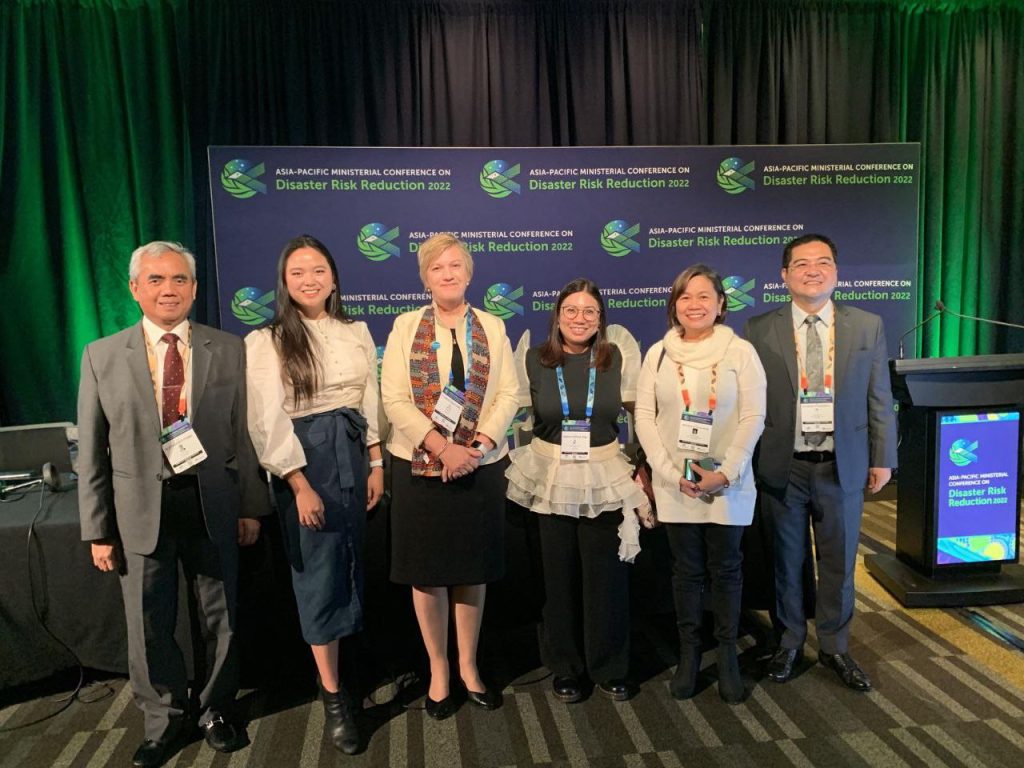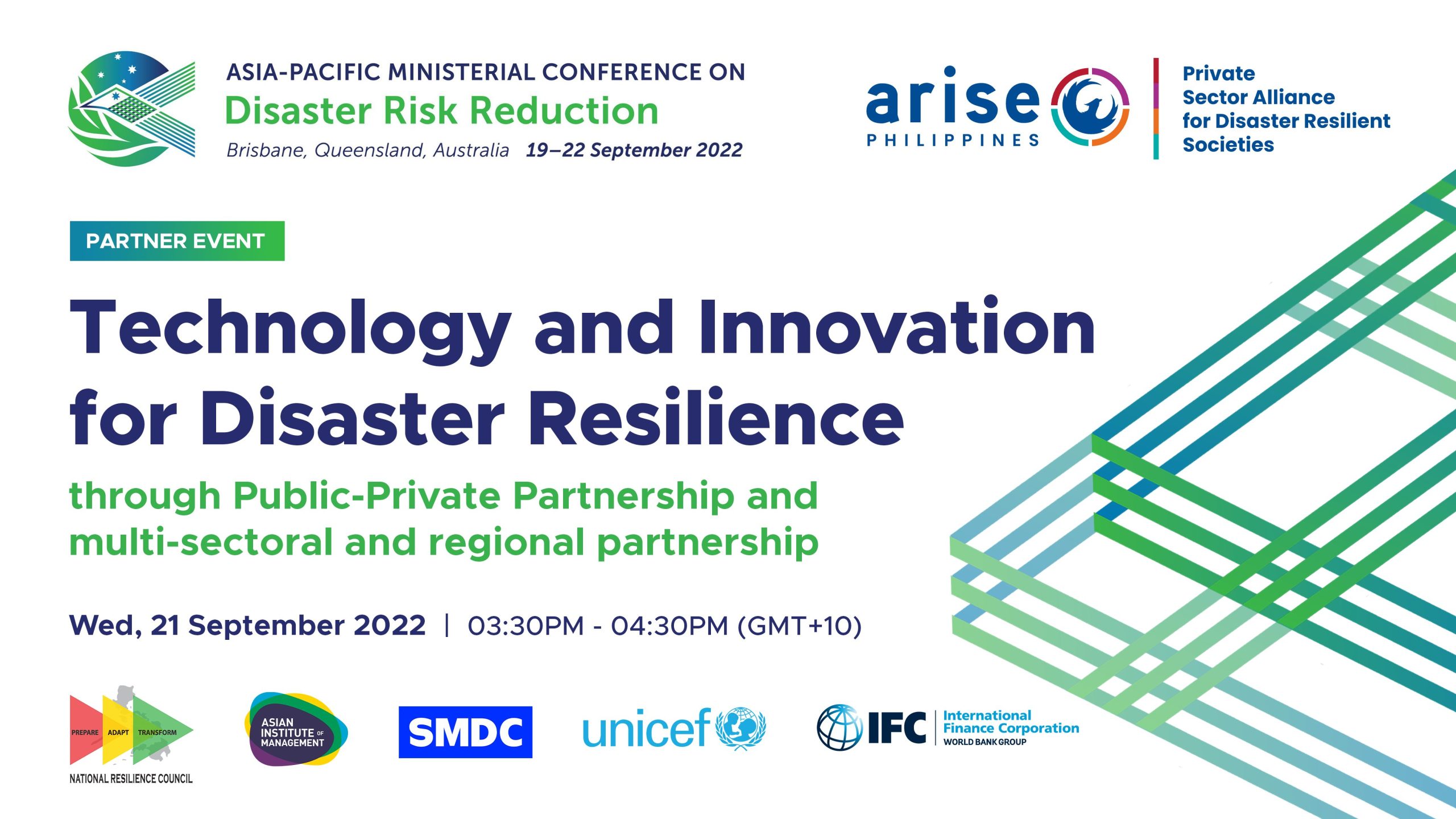
Whole-of-Society Approach to Advance Technology and innovation for Disaster Resilience
Brisbane, Australia – ARISE Philippines hosted a partner event on the third day of the 2022 Asia Pacific Ministerial Conference on Disaster Risk Reduction (APMCDRR). The event on the 21st of September was held in partnership with the National Resilience Council (NRC), Asian Institute of Management (AIM), SM Development Corporation (SMDC), UNICEF, and the International Finance Corporation (IFC).
Mr. Silvestre Barrameda, Jr, Executive Director of the National Resilience Council (NRC), opened and moderated the event with its speakers representing sectors exemplifying inclusive public-private collaboration. Dr. Marqueza Reyes (Assistant Professor – AIM, Resilience and Change Management Consultant – Climate Change Commission), Board Member of ARISE Philippines, laid out the event’s objectives and acknowledged the private sector as the technological fountainhead in our society. The public sector can benefit from the private sector’s agility and ability to innovate, empowering them to substantially enhance and elevate disaster risk reduction and management practices and measures in terms of disaster mitigation, preparedness, response, and recovery. One popular and effective way to do this is through Public-Private Partnership (PPP).
Testaments of the power of inclusive and strategic partnerships and maximizing technology and innovation in DRR
Vice Admiral Alexander Pama (Ret.), Co-Chair of ARISE Philippines, took the stage to highlight a whole of society’s approach to developing shared responsibility and commitment to resilience. According to him, climate change, with its impacts and consequences, is a shared experience. He rallied to co-owning the challenge of disaster risk reduction and co-creating solutions with the joint participation of governments, the private sector, civil society, and other vulnerable groups toward a sustainable and resilient future.
Mr. Ommid Saberi, Global Lead and Product Manager of Building Resilience Index (BRI) emphasized that disasters are costly and assets are mostly uninsured. BRI is an innovation of IFC, a member of the World Bank Group, developed together with the private sector. It showcased the benefits of understanding the disaster risk for small, medium, and large enterprises and local governments and households. Saberi shared how the BRI tool aims to help the built sector identify, manage and disclose risks. As of August 2022, 2 million square meters of space were pledged in the Philippines, with ten construction developers, 46 projects, and 9,689 housing units reviewed by the BRI.
The next panelist was Ms. Cynthia Diaz, Crisis Resiliency Head of ePLDT and an Executive Masters in Disaster Risk and Crisis Management graduate at AIM in the Philippines. While in AIM, she and her group mates developed Padayon. This donation-matching application, now in its prototype stage, bridges donations of individuals and corporations to areas that need it the most in times of disaster. Donations are matched to the specific needs of the affected communities to ensure that they receive what is required on the ground.
The partner event also featured the talk by Ms. Rana Flowers, representing UNICEF Vietnam, highlighting the necessity of working with and for children and young people in DRR and innovation. DRR efforts will have to go beyond PPP. Thus, it is imperative to recognize, harness, and collaborate with the efforts of other national and regional DRR initiatives that are specifically oriented to those most vulnerable such as PWDs and children. Ms. Flowers shared that children and youth are often the most severely impacted when disasters strike but they also want society to recognize the youth sector’s capacity to co-create solutions for DRR.
Ms. Jessica Sy, Assistant Vice President/Project Director of SM Development Corporation (SMDC), presented SM’s inclusive and sustainable urban development through adopting technological applications. They ensure properties are designed for solid waste management, energy, water efficiency, and air conservation to reduce its effects on the natural environment and combat climate change. The company’s initiatives align with the UN Sendai Framework for DRR through partnerships with the national government and civil society groups in risk-based assessment and implementation and internal capacity building. SM Prime Holdings, Inc. is committed to being steadfast in being one of the leaders in the private sector to embrace new technological advancements to safeguard a better quality of life for future generations.
Mr. Barrameda ended the event with a reminder that resilience is everybody’s business. Both the public and private sectors play vital roles in a resilient future. Science, technology, and innovation are fundamental drivers to creating solutions for disaster risk reduction and climate resilience. Guided by the SDGs and Sendai Framework, we must make it work for the people and most vulnerable sectors.
The article above is a condensed version, you may click here for a copy of the full report of the APMCDRR Partner Event.

